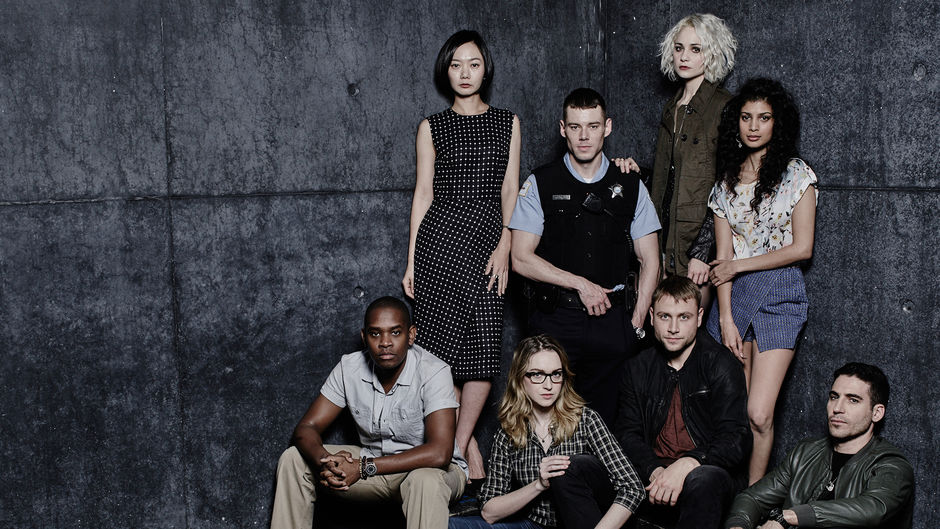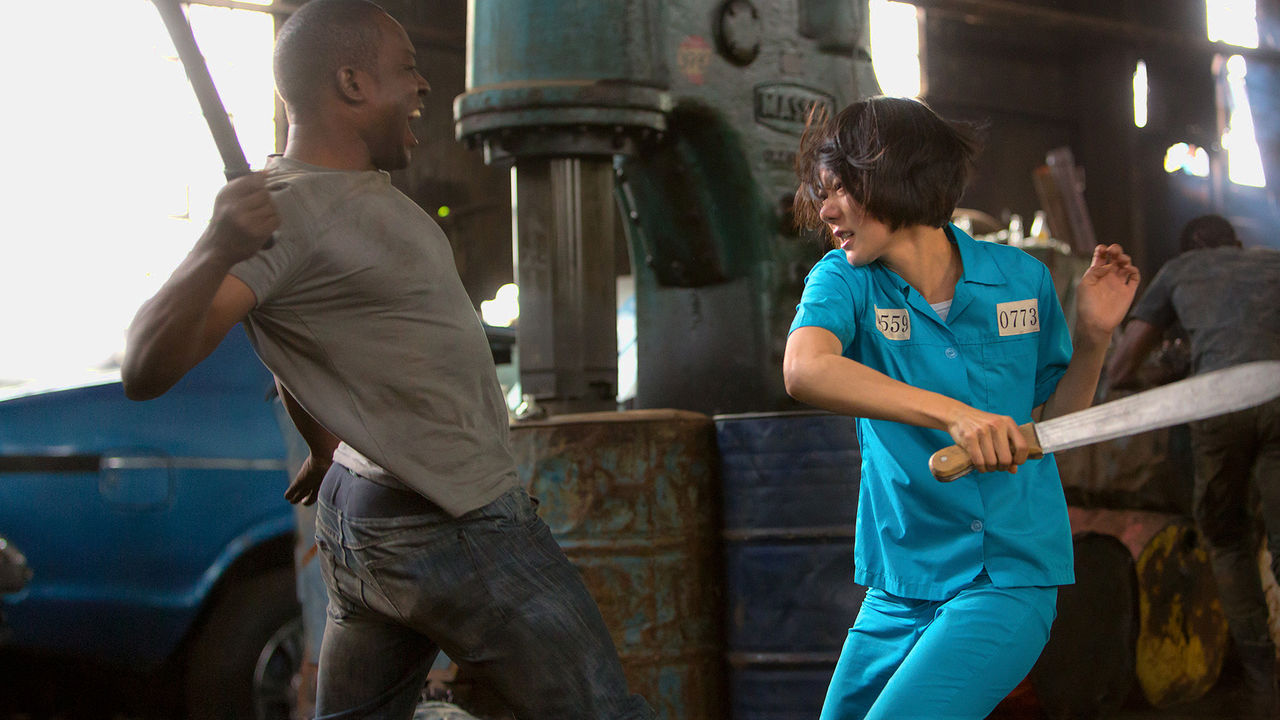Your TV Sluts have already reviewed
Netflix’s Sense8, but with all
due respect to my fellow bloggers, I’m here to offer a counterpoint. Rather
than being a collection of disjoined stories that foists generic political
correctness on the TV landscape, I submit that the show is moving, beautiful,
and incredibly unique.
If you’ll recall, Sense8
tells the stories of eight strangers picked to live in a house who
somehow become mentally connected to each other. Each of the characters live in
a different city and most live on different continents, as such the stories
told are both stories about the individual characters’ lives, but also about
the cities they inhabit. And of course, because nothing is simple, these eight
people are also being targeted by a mysterious organization that wants to… kill
them? Dissect them? Mate with them? It’s
unclear.
Maybe they're planning on shooting the album cover for a '90s era alt rock band?
The action begins when one of these special people,
Angelica (played by Darryl Hannah), kills herself in front of her
sometime-lover Jonas (Naveen Andrews, reprising all the weird stuff about his
character in Lost) because the
mysterious Whisper is about to close in on her and if he does, terrible things
will happen. In killing herself,
Angelica “births” the next cluster of Sensates, the folk who will make up our
cast of heroes, and leaves Jonas as the (presumably) last remaining member of his cluster.
So who are the new cluster? Roll call!
·
Capheus (Aml Ameen), a bus driver in Nairobi who
is desperately trying to get money for his mother’s HIV treatments.
·
Sun (Bae Doona), a financial executive in Seoul
who’s relationship with her father and brother is strained after the death of
her mother.
·
Nomi (Jamie Clayton), a trans woman and
hacktivist living with her girlfriend in San Francisco. (Said girlfriend is
played by Freema Agyeman, of Doctor Who Martha Jones fame, btw.)
·
Kala (Tina Desai), a pharmacist in Mumbai who is
engaged to a man she doesn’t love.
·
Riley (Tuppence Middleton), an Icelandic DJ
living in London with a tragedy in her past.
·
Wolfgang (Max Riemelt), a locksmith and jewel
thief in Berlin.
·
Lito (Miguel Angel Silvestre), a closeted actor
in Mexico City who has built his fame on playing tough, macho roles.
·
Will (Brian J. Smith), a police officer in
Chicago haunted by an unsolved murder .
And therein begins the action as each of the new Sensates
begins to see and interact with each across global distances. As they each come into contact more
frequently with each other, they begin to realize that they can not only speak
to each other, hear each other, and see each other, they can become each other
if they need to. Each Sensate can sort of possess the other and lend his or her
knowledge, skills, and abilities to whatever the task is at hand.
This proves especially effective as Nomi is hospitalized
early on and imprisoned by the organization that Whisper works for, telling her
that she has a serious brain tumor that they need to remove but surely seems like what's going on is far more sinister. Nomi is the first to realize that she can borrow
Wolfgang’s lock-picking ability break out of the hospital, Will’s knowledge of
police procedure to out-maneuver a team of guards trying to apprehend her, and
Sun’s experience as a kickboxer to subdue some of the more handsy guards.
The "I" in team.
Which is what brings us to what could be the hard line to cross for
some viewers – despite an interesting premise and a wide collection of
characters, the first five episodes of the show do tend to lag. Only Nomi
seems to have much action central to the big mystery of the show while the rest
of the Sensates are just sort of tripping out on seeing and meeting these other
people that they’re connected to.
Sense8 is a product of J. Michael Straczynski and the
Wachowskis. For those familiar with Straczynski’s work on shows like Babylon 5 or Jeremiah will be familiar with his slow-burn approach to writing.
The man is a genius at putting together stories that have long payouts but seemingly
slow starts. This has been called Joss Whedon Syndrome, but it’s probably more
accurate to say that Joss Whedon has a case of Straczynski Syndrome. While slow
burns and long payouts can make for some mind-blowing experiences, they
unfortunately ignore one of the central truisms of television: don’t hold back.
As a series creator, you never know if you’re going to get to season five, so
don’t hold off on your great moments in season one.
And yes, that means you always include a fight with a machete.
But if the plot is, at least to begin with, less than
utterly thrilling, the show more than makes up for that in the casting and the
production design. To understand how incredible this show is, consider that
each of the scenes were filmed on location. Chicago scenes were shot in
Chicago. Nairobi scenes in Nairobi. For each character, we’re not seeing a
studio set built in Los Angeles, we’re getting the real deal which also means
we’re getting the real cast and crew from a diverse background. As such, this
is as much a science-fiction/action story as it is a story about how interconnected
the modern world is. In that sense, it’s very much one of the first real
multinational television shows. Add to
that how lushly visualized it is and you can begin to appreciate the different
storylines even more. The show is, simply put, beautifully shot. The picture is
rich and cinematic and it feels far more like watching a movie than watching a
television show.
But the real strength of Sense8 is the characters. Plenty of shows have token characters.
It’s not that hard to find a show with the One Black Guy or the Cool Asian
Girl, almost always used as set-dressing to back up the lives and experiences
of the main white protagonists. Despite what Hollywood typically believes, you
can tell stories that feature more than one person of color. And Sense8 does this in spades. The show has
arguably 16 main characters. Of them, six are white, three are black, three are
Indian, three are Latino or Latina. Sun
represents one of the only East Asian characters, however given how solitary
her story is that’s unsurprising. Going further, four characters are gay and
one is transgender.
That’s not to suggest that everything is perfect with the
characterizations. Even with ten episodes, that’s not a lot of time to fully
flesh out eight characters and some characters veer closely to stereotypes at
times. (Sun’s kickboxing background is a good example of this, though at least
she’s given a reason to be the one Asian person who is also a martial artist
and it’s not just the product of “honor” or something.) All the more reason why
I want another season from the show to help these characters become even more
fleshed out.
What’s impressive about the diversity of the show is the
fact that it was put to film at all. The creators have stated that the genesis
of the show was thinking about how easy it is to make people into an Other and
that the show was a way to illustrate how tribes form and what that does to
humans when they suddenly realize they’re connected to someone different from
them. And while none of the characters are expressly bigoted or hateful in any
way (which is almost a shame because that could also have been an interesting
story), half of the joy of watching these characters come together is seeing
the beautiful ways in which they connect. A few of them are given sweet love
stories; the meeting of Wolfgang and Kala, opposites if ever there were one,
has all the hallmarks of a Hollywood romance. Riley and Will’s growing
flirtation and attraction to each other plays off as less dramatic and
sweeping, but still compelling. On the other end of the spectrum, the bonding
that begins between Cepheus and Sun as two people who are so self-sacrificing
to their families that it’s causing them a great deal of personal pain is a
compelling story about how friendships can actually be formed without having to
turn into something romantic.
The diversity represented in Sense8 is likely a reason for the divided opinion on it. As the
nation is learning, it can very uncomfortable to look at representations of
ourselves and see what’s missing as well as what’s on display. And yes, this show embraces its differences.
Ostensibly a mainstream television show, it takes pains to introduce
multicultural themes that aren’t usually talked about. Kala’s devotion to
Hindu-ism is a direct contract to her future father-in-law’s desire to
eradicate old style beliefs from India, believing that they make the country
seem backward. Nomi is presented as a comfortable, confident transgender woman
who doesn’t feel any pressure to “forgive and forget” her mother’s ongoing
brutality to her by denying her identity. In one particularly moving speech, a
heartbroken Lito describes the first time he performed oral sex on his male
partner and how that experience was spiritual and transcendent for him. These
aren’t the narratives that make it into most television.
It's not all touching sentimentality. There's also a five-minute mind orgy that happens at one point.
On August 8, Netflix announced that Sense8 would get a second season. August 8th is an
important date in the mythology of the show. Nice cross-marketing there,
Netflix. It also dovetails nicely with the title and the repetition of the
number eight. The show has proven popular (it is the most pirated Netflix show
created) but has had a polarizing critical analysis. It also has to be
extremely expensive to film, given the Wachowski’s insistence on filming on
location in each of the major cities with a little extra time in Reykjavik for
good measure. But for someone like me who really wants to see more of this
show, and more about shows with this level of diversity in general, the second
season is a gift.





No comments:
Post a Comment